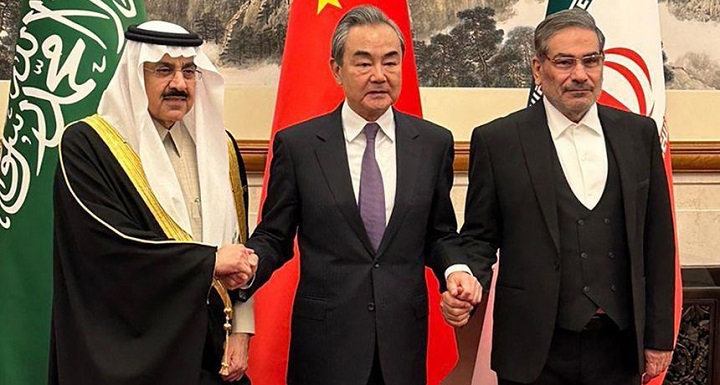
Many factors decided the Saudis and the Iranians to abandon their long standing hostility and enter into peace negotiations under Chinese auspices, a regional sea change announced March 10, 2023. But what induced Riyadh to spurn Washington and drop the imminent negotiation with Tel Aviv that since assuming office Prime Minister Netanyahu has been insisting was the Israeli key to peace – with the Palestinians, the Arabic world, and (incidentally) to securing his precarious position in a sharply divided Israel?
“The traditional (U.S.) alliance with Saudi Arabia and other countries,” said Netanyahu, “has to be reaffirmed. There should not be periodic swings, or even wild swings in this relationship, because I think that the alliance…is the anchor of stability in our region.” Thus (Reuters 12/15/22) Netanyahu voices his serious concern that Washington has alienated Riyadh when Netanyahu sees reconciliation with Riyadh as indispensable for Israel.
Washington has been critical of Riyadh over oil marketing, the Yemen war, and the Kashoggi incident. Tel Aviv has been urging Washington to mend fences with the Saudis and shepherd them into the Abraham Accords, which include the UAE, Bahrain, Morocco, and Sudan. The Accords were meant to build a coalition against Iran.
The situation is well described by James Traub in the 2/8/23 issue of Foreign Policy: “Netanyahu has drawn a Saudi-US Road Map (but Joe Biden shouldn’t play along).” Differing from Netanyahu, Traub was urging Biden not to concede any ground to the Saudis given their misdeeds, confident that hostility to Iran was an unbreakable US-Saudi-Israeli bond and overrode Riyadh’s professed sympathies for the Palestinian cause or irritation at Washington’s insults.
One wonders if Netanyahu, more perceptive than the Beltway Savants, sensed that Riyadh might reverse course? In the event Traub overrated the Accords and Washington’s influence.
The Chinese démarche prompts a re-think. Had Riyadh’s decision been gestating quietly or was it a surprise response to Netanyahu’s draconian governmental reforms and the crisis they have created internally and externally. It looks as if Riyadh meant to embarrass Netanyahu just as he was expressing confidence in delivering Riyadh into the Accords? Did Israel’s escalating conflicts with Iran and Syria also influence Riyadh?
And where do the Chinese fit in? Just as the timing of the démarche seems significant tactically for Tehran and Riyadh, so the timing is meaningful for Beijing, which regards Taiwan as its key security issue now that criticism over Xinjiang and Hong Kong has faded to ritual in US propaganda.
Here the Russian comment that Washington is not “agreement-capable” comes in. Having seen Washington renege on arms agreements with Iran and Russia as well as President Nixon’s original agreements with Beijing on Taiwan, Beijing has decided to challenge American policy where it is belligerent if a contribution to peace can be made. Although the entire world recognizes Taiwan as sovereign Chinese territory, US and other media ritually claim (as required) that Beijing “claims” authority over Taiwan. There is high war potential in this obvious nudge toward independence and denial of facts the world recognizes.
Washington’s regional partners Japan, South Korea, and Australia have vital relations with China and are ambivalent about Washington’s militancy, which has been heightened by NATO whose “defensive” bombing of Libya, Iraq, Afghanistan, etc. is little appreciated in the Arabic world. Although a bit quieter of late, NATO’s assertions that it has a role to play in the Far East are as provocative as they were in eastern Europe.
Since China regards NATO as central to the fighting in Ukraine, Jens Stoltenberg’s insistence that NATO means to insert itself into the Indo-Pacific (meaning Asia minus China) has led the Chinese to see NATO maneuvering to use Taiwan as a proxy to pressure China militarily as it has used Ukraine as a proxy against Russia. In this context Beijing saw the opportunity to utilize its good relations with Riyadh and Tehran to step onto the global stage — as it did back in 1955 in Bandung between the Korean and Vietnam wars — and push the US and NATO aside as a threat to peace.
China’s West Asia initiative opened the door to its twelve point Peace Plan for Ukraine, offering services in negotiation and reconstruction. With indignant haste Washington derided the plan, but by doing so reaffirmed the widespread impression that Washington means to keep the fighting going. The wisdom of the Chinese plan is that it may take outside forces to bring about a settlement with Ukraine and Russia locked into absolute non-negotiable positions, a rising threat to Europe’s economic and military security. In this context France, Germany and Spain have declined to follow Washington on China as Macron visited China and explicitly took a line from India’s neutralism to say that Europe need take no part in China’s conflict with Taiwan. Japan and South Korea will silently agree.
What seems to have escaped Washington’s diplomats, whose weak point is diplomacy, is the subtle meaning of the Chinese plan. What its vague benign suggestions imply between the lines is that Washington should get off its high horse, impress the world (whose trust has dwindled) with a show of Christian humility, and reach out to the Chinese to arrange an end to the war in Ukraine. Should the Mountain be in the mood to welcome Mohamet, that is.





